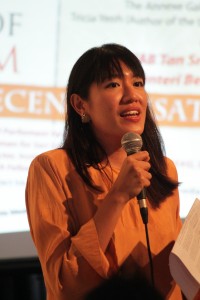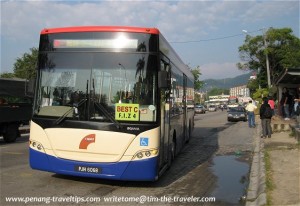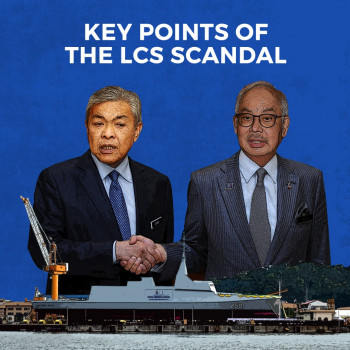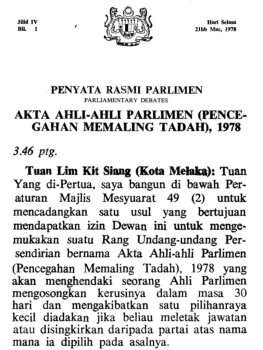In 2008 Malaysians made the unprecedented political change of electing a record five Pakatan Rakyat state governments. However for many, the political change has not seems to be translated into their daily lives. This stems from the uneven structure of governing power in which the federal government controls almost every aspect of people’ lives while the states are left with little power. Tricia Yeoh explains about some of the nuances of Malaysia’s federalism and why we need decentralisation and crucially, why PR is the best alternative to achieve it. Report by T.K Tan
Almost unitary in nature
Officially Malaysia practices federalism with different levels of government having sovereignty over their jurisdiction. In essence according to Tricia, “Malaysia has a very strong federal government that has extensive administrative authority, policy making and control of fiscal resources,” Tricia began.
On the other hand the states are left with control in land matters, forest resources, religion and local councils.
What are some examples of the federal government’s (FG) ordering of our lives? Tricia mooted the example the public bus transport.
“The FG via Land Public Transport Commission (SPAD) in controls the public bus system in all states. Can we expect a Putrajaya-based federal agency which may not even have federal offices in all the states to monitor and decide what are the best routes and number of buses in the states?”
Another federal dominance in state governance is the appointment of department heads and staffs for the state bureaucracy.
“Many of the states are encumbered as their high-level staffs need to be recruited, vetted and approved by the Public Service Department (PSD), a federal agency,” she mentioned.
 “In Selangor the state secretary, state financial and legal officer sits in the exco meeting. They are all hired by PSD. These civil servants come from the same pool of bureaucracy that shares the same scale of remuneration and pension benefits with their federal counterparts.”
“In Selangor the state secretary, state financial and legal officer sits in the exco meeting. They are all hired by PSD. These civil servants come from the same pool of bureaucracy that shares the same scale of remuneration and pension benefits with their federal counterparts.”
Conflict of interest abounds as these civil servants are evaluated by the FG although they serve the state government (SG). Would they not be more inclined to abide by the FG’s wishes and not the SG’s directives?
“As an example even though the local councils are under the SG’s jurisdiction, the staffs running them are answerable to the FG.”
“Some of the local council heads in Selangor have been recalled by the FG recently; it is how the FG exercised power over these state civil servants. The former MPSJ head was recalled by the FG and now serves as the secretary general of the Federal Territories (KL), a promotion for him,” she explained.
“In the past there was only one political master to serve, BN, at all levels of government. As a result of the past culture imbibed into them, many older state civil servants were conservative in carrying out their duties, doing it by the book and not much more. It is out of habit as well.”
Why decentralisation needed
The question arises as to why we need decentralisation of governance, if the authority, FG or SG, is delivering the services needed.
“The government that is closest to the people would make better and more flexible decisions in solving their local problems arise. It’s about efficiency and effectiveness of service delivery,” she explains.
“In a people-centric governance, it is logical and reasonable to expect that the government closest to the people would be able to make the better decisions.”
“There is a direct feedback process in place to help the local government solve the problems that arises instead of having to go through the entire chain of feedback to the federal headquarters in Putrajaya.”
Will the people be more satisfied with decentralisation? “We need to educate the people to be empowered and take over the local governing functions related to them. When they own it and implement it themselves, they will be satisfied about decentralisation.”
Tricia points out that there are certain preconditions that need to exist for decentralisation to work. “When local authorities are given more power, they also need more fiscal power to carry out their administrative and development functions.”
Does that mean all the states are ready for full fiscal autonomy? “We need to look at the level of development of the states. Selangor may contribute more than 20 percent of the total amount of taxes collected by FG; it doesn’t mean that it should receive all that amount collected.”
“Some states such as Kelantan and Perlis need additional funding from the FG to help out in their physical development.”
Tricia believes decentralisation of fiscal authority is good for the country as a whole. “Giving more fiscal authority to the states means they will compete amongst themselves for more investments and sources of revenue and improve on their revenue collection efforts.”
However Tricia is sceptical about Malaysia’s readiness for decentralisation in the immediate future. “It may take 5 to 10 years for the people to take up more self-rule of the local issues and governance. In other countries such as India there is a very strong sense of self-rule and autonomy.”
“Without a bottom-up driven demand, it’s hard to galvanise a movement to ask for more decentralisation and power to rule ourselves. We have grown accustomed to an overpowering unitary authority that took care of the issues and problems faced by the people that we have surrendered this attitude of ownership of governance,” she lamented.
“This empowerment process means educating Malaysians to take back these basic functions. We can’t rely on the FG to regulate and run our lives as they are getting bloated by the day.”
“This process will take time as the Indonesia example shows. There was an entire change in the governing mindset and structure. But look at how Indonesia has benefitted. In essence, we are saying, who knows your problems best and who better to handle them if not the government closest to you.”
Making do
Despite almost suffocating interference and extensive control by the FG, Tricia believes PR states have performed reasonably well in circumventing the FG dominance on the states.
“In Penang, the SG has set up the women development corporation (that deals with women and gender issues), the Penang Institute (an institutionalised way of generating ideas for better governance) and also the Penang Transport Council (looking into the state’s transport woes).”
“All these initiatives serve as a way of challenging the FG to adopt best ideas even though the SG can’t interfere into the FG’s functions.”
As for Selangor, it has embarked on rolling out the three year Selangor Blueprint Plan 2011-2013. “This plan has involved consultation and briefing sessions with the various stakeholders in the state, unprecedented for the state on something this large a scale. There is also the alternative investment statutory body that promotes the state as investment destinations in more creative means.”
Some of the other initiatives also include:
- Providing free and subsidised buses such as CAT and BEST for the public in Penang
- Enacting Freedom of Information Act in Selangor that enables the public to access public documents
- Various welfare programs in all the states to help the poor and needy
- Enforcing no-plastic bag ruling to cut down on solid waste disposal
Tricia believed the PR states could have done more. “For example, the local councils’ administration structure could have been changed to reflect the realities and flexibility in handling the problems that arises. This would also help reduce the bureaucracy that creates redundancy.”
The case for decentralisation
Despite all the benefits of decentralisation, in the last few decades BN has taken the reverse path by tightening the terms of power across the governing tiers.
“BN will not delegate more administrative and fiscal power to the states as this would give the PR-run states a brighter chance to run the states better. In fact they would be looking to control the states even more and stifle the PR run states’ governance.”
One of the most prominent examples of this interfering is the water consolidation exercise in Selangor.
“Despite initially agreeing to let the Selangor state government to lead the consolidation of the water concessionaires’ exercise in February 2008, the FG has backtracked on its promise and even interfered by bailing out some of the concessionaires. As a result the companies have resisted the state government’s takeover offer. The matter has not been resolved yet.”
Growing pains
Running the four states has certainly not been easy for PR. Some of its new initiatives have brought mixed reactions from the public. An example is the solid waste management. With the passing of the Solid Waste Management and Public Cleaning Act in 2007, the FG assumed direct control over the solid waste disposals.
The LCs throughout the country was directed not renew the local waste disposal contractors’ contracts, with the aim of centralising the functions under one contractor. However, Selangor and Penang have not followed suit.
“Selangor’s rationale of not renewing Alam Flora’s solid waste disposal contract was because the company was charging the state an exorbitant rate and they were also subcontracting the work to other contractors.”
“The Selangor SG wanted to cut out this redundancy and also deliver the service for the people. Even the FG was paying Alam Flora for its services and its coming out of the people’s pocket as well!”
The rubbish collection bottleneck in Selangor has been a source of gripe for the PR states residents.
“This tinkering and changing of the system will one day bear fruit. However the delivery has been haphazard in the meantime.”
“Some of the residents want to go back to federal centralisation because things were a lot more orderly and the service delivery were relatively good. But this would defeat the entire purpose of empowerment, which is giving you the option to make the better choice.”
“PR is changing the system whereby it is reintroducing honesty and integrity into the system that has been missing since the BN years of governance.
Best choice
Despite all that Tricia believes PR is still the best party to implement fight decentralisation in the country. “PR is inclined to want more power for the states as it has power at the state level. The challenge will come if PR wins at the federal level but are still facing BN-run state governments.”
“PR will have to live up to its promise to decentralise the power structure of governance. It will be an issue of moral conscience for PR to honour its word to give power back to the states, whether PR or BN run.”
“This is what PR has been fighting for all along and it has allied itself to the people’s desire to want governance change. In Kelantan, Terengganu, Sarawak and Sabah PR has promised 20 percent oil royalty for these states. PR will have to live up to its word of providing them more autonomy or it will be a slap to its face.” -The Rocket




